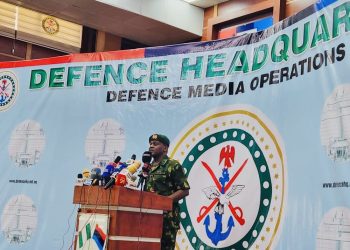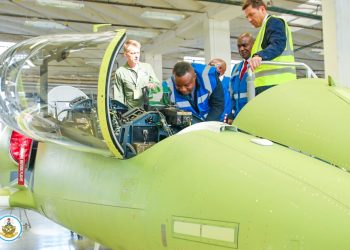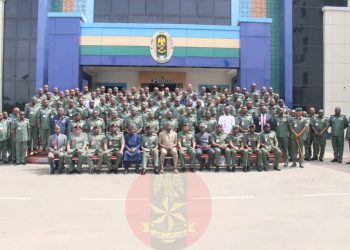By Chidi Omeje
For the better part of last week, the Nigerian Air Force (NAF) was under intense media scrutiny following the reported mistaken bombing of innocent civilians in the course of its counterterrorism operations in Zamfara State. According to reports, a number of civilians lost their lives in the unfortunate accident.
Even though the remorseful NAF authorities had dispatched a high-powered fact-finding team to ascertain the veracity of the report and true identity of the victims, what made the media trial even more strident was that the incident happened not long after a similar one was reported in Silame Local Government Area of Sokoto State which also claimed the lives of a number of locals.
While these accidents are undoubtedly tragic and devastating, it is essential to acknowledge that they are some of the fallouts of military operations. A professional fighting force with very well-intentioned, committed and patriotic personnel who are willing, able and ready to be on the harm’s way in defence of Nigeria from external aggression or internal insurrection, NAF’s efforts have been instrumental in combating terrorism and insurgency in nigeria, and it’s crucial to recognize their sacrifices and dedication.
Apart from internal security operations, the Nigerian Air Force is currently primed to be the game-changer as Nigeria, along with her neighours and partners, gear up to confront the complex security challenges that are afoot in the Sahel region.
With wings outstretched, the Nigerian Air Force (NAF) has soared through the expanse of time, its storied history unfolding like a canvas of courage and resilience. A little over six decades of distinguished service to the nation, the NAF has come a long way as the jewel of the Nigerian Armed Forces and people.
While it strives to maintain its sharp eye in the sky, the Nigerian Air Force, like every other human organization, has never laid claim to perfection or being immune from mistakes and tragedies. It is even apropos to point out here that no air force across the world that is engaged in the kind of asymmetrical warfare that Nigeria’s counter-insurgency and anti-banditry operations entail has ever escaped tragic incidents in the form of mistaken bombing or air mishaps. Why? Because in most cases, there is no clear demarcation of battle lines, and also, the enemies are sometimes well-embedded within the civilian communities, making it extremely difficult for precision strikes. Even at that, the NAF has always conducted operations with extreme caution and restraint to minimize collateral damage, while also undertaking humanitarian programs to win the hearts and minds of the civil populace.
More importantly, the authorities of the Nigerian Air Force have consistently demonstrated a commitment to transparency and accountability, always being truthful and forthright with the Nigerian people. Whenever setbacks or mishaps have occurred, the NAF leadership has promptly acknowledged these incidents, taken responsibility, and provided clear explanations and apologies. This openness has fostered trust and credibility between the NAF and the Nigerian public, demonstrating the force’s dedication to serving the nation with integrity and honor.
In one of his interviews with the media, the Chief of Air Staff, Air Marshal Hassan Abubakar, did emphasize the importance of minimizing harm to civilians and infrastructure in the course of their operations. According to him, the Nigerian Air Force (NAF) is committed to addressing the issue of mistaken bombings and minimizing harm to civilians. In pursuit of this goal, NAF is implementing a multifaceted strategy to enhance our operational effectiveness and safety standards.
At the forefront of those efforts, according to him, is the enhancement of intelligence, surveillance, and reconnaissance capabilities. “By improving our ability to gather and analyze accurate intelligence, we aim to ensure that our targeting is precise and collateral damage is minimized. This is being achieved through the strengthening of our coordination with ground troops, enabling real-time information sharing and reducing the likelihood of errors’, he disclosed.
He equally stated that the NAF usually implements robust target verification processes to confirm the identity and location of targets before engaging. This additional layer of verification is undoubtedly crucial in ensuring that the risk of mistaken bombings is minimized.
In addition to these measures, I will suggest that the federal government should, as a matter of priority, empower NAF to invest more in modern technology. It should acquire advanced precision-guided munitions and upgrade existing aircraft with modern targeting systems. This will significantly enhance their ability to conduct operations with precision and accuracy.
NAF personnel should also undergo regular training exercises to enhance their skills and decision-making. This should be complemented by the commitment to periodically review and refine its operational procedures, incorporating lessons learned and best practices. Ultimately, the goal is to foster a culture of transparency and accountability within the NAF.
I have no doubt that the future is looking great for the Nigerian Air Force in terms of its contributions to the defence and security of Nigeria and the sub-region; therefore, rather than casting aspersions and denigrating their efforts on account of unintended mishaps, Nigerians should acknowledge the complexities and challenges involved in counter-insurgency operations. Criticism should be constructive and aimed at improving the NAF’s strategies and tactics, rather than undermining their morale and efforts. It’s essential to remember that the NAF is working to protect Nigerian citizens from the threats of terrorism and insurgency.
By supporting and appreciating their efforts, we can work together to build a safer and more secure Nigeria.
Chidi Omeje is the publisher/Editor-in-Chief, Security Digest (www.securitydigestng.com)















